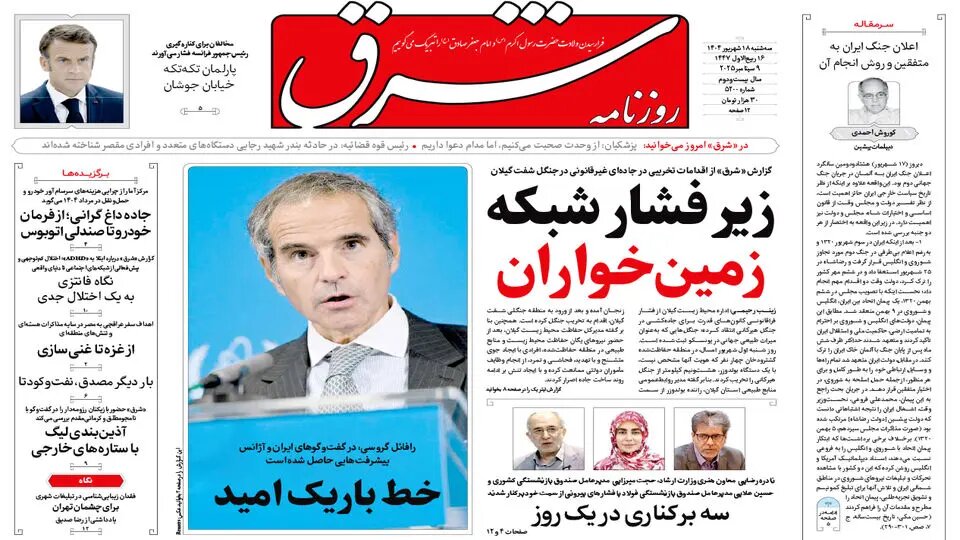Opportunity for diplomacy and threat of multiple domestic voices

TEHRAN - In an analysis, Shargh discussed the agreement between Iran and the IAEA and the pressure from extremist groups within the country and wrote: The recent agreement between Tehran and the IAEA can initiate a new chapter in Iran's nuclear interactions with the international community.
However, before this agreement could show its effects internationally, it faced a wave of criticism from extremists inside the country; attacks that were more political than technical and professional. At the current juncture, Iran is in dire need of a coherent and multi-layered approach in face of external pressures. The recent agreement with the IAEA, despite all limitations, could be an opportunity to unlock diplomacy and reduce tensions. The political attacks on this agreement come at a time when Europe and the United States have called for an immediate and complete implementation of Iran's commitments with threatening language and have even raised the possibility of (UN) sanctions return in the next two weeks. In such circumstances, any multiple domestic voices not only weaken diplomacy but can also encourage the West to adopt more stringent positions down the road.
Javan: European troika has become a U.S. proxy force
Javan pointed to lack of independence by the European troika (Britain, France and Germany) that implements U.S. orders against Iran in an interview with Nader Entesar, a retired distinguished professor of political science. He said: The European troika is not an independent player and has a proxy role for the U.S. in relation to Iran. With the invoking of the snapback, these three European countries have continued their proxy role because the U.S. is no longer a member of the JCPOA and cannot trigger the snapback process alone; therefore, it has entrusted this task to the European troika. If Iran goes under Chapter VII of the Charter, it will be more difficult to prevent the start of a new war. Iran should strengthen its cooperation with China, Russia, and other countries that oppose the war without empty slogans and strengthen position through diplomacy. Iran should also be prepared to deal with the worst-case scenarios, even if the worst-case scenario does not happen. In addition, Iran should adjust its economic policies in accordance with the serious dangers that threaten the country, and make the necessary changes in the country's economic structure as soon as possible.
Khorasan: Why did Iran negotiate with IAEA again?
In a note, the Khorasan newspaper discussed the reason why Iran resumed negotiations with the IAEA and said: The reason for the renegotiation should be sought in regard to the snapback mechanism (that has been invoked by the European troika that would return the UN sanctions against Iran). The activation of this legal instrument could bring Iran back under Chapter VII of the UN Charter. From an economic point of view, experts estimate that a full implementation of the snapback could disrupt between 30 to 50 percent of Iran’s economic activities, which would severely affect not only the national economy but also the daily livelihoods of the people. From a political and legal point of view, return to Chapter VII would limit Iran’s diplomatic maneuvers and effectively place the country in a new, risky situation. For this reason, the diplomatic apparatus is obliged to use all possible tools, including well-thought cooperation with the Agency, to prevent the activation of the snapback sanctions. Negotiations with the Agency, despite all bitterness and distrust, are an inevitable tactic to buy time and prevent Iran from entering the vortex of Chapter 7.
Ettelaat: Winning public trust is most important issue against the enemy
Ettelaat discussed the situation in the country on the eve of possible implementation of the snapback mechanism with Mehdi Zakarian, an international affairs analyst. He said: Iran has missed opportunities to resolve the issues facing the country and has now entered the phase of mandatory choices. The mandatory options are dictated by the great powers. The political system in Iran is also facing problems and deficiencies. Therefore, in a situation in which the world sets conditions and restrictions and make threats, the governing system must consider itself accountable to the public opinion and act transparently. If the relationship between the people and the government is favorable and mutually assuring, the political system will have the upper hand when negotiating with foreigners and have significant bargaining power. If the political system can win the trust of the people, many problems will be solved, and this will not happen without serious changes in policymaking.
Leave a Comment